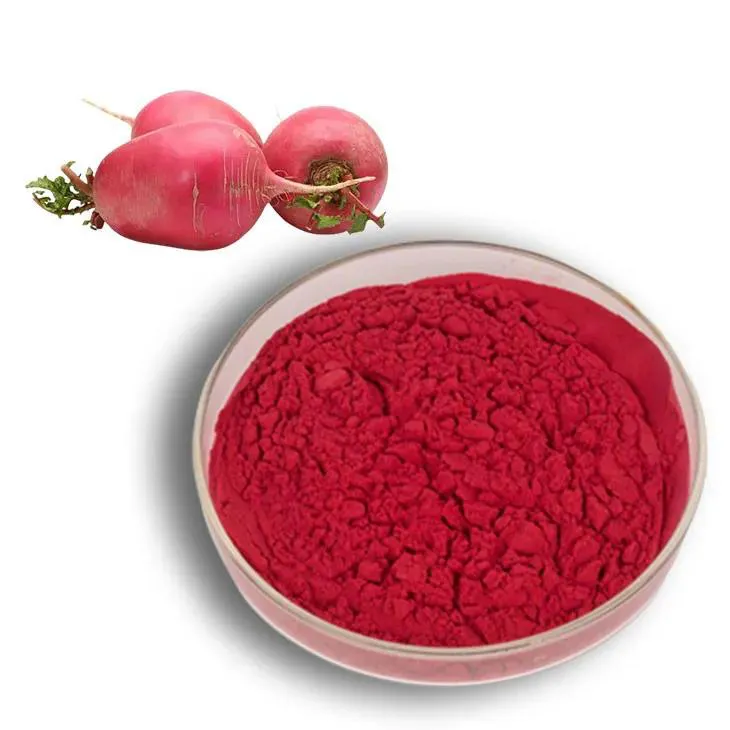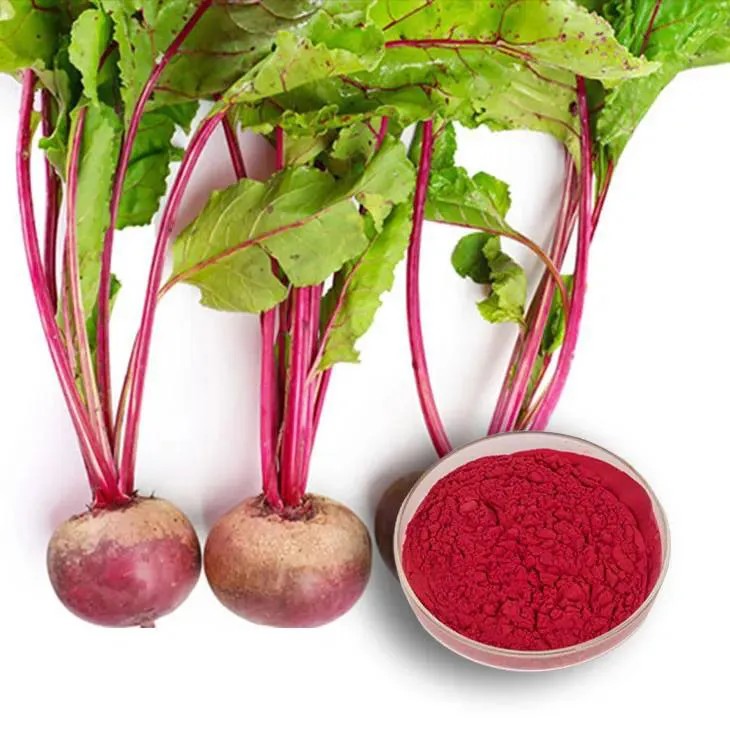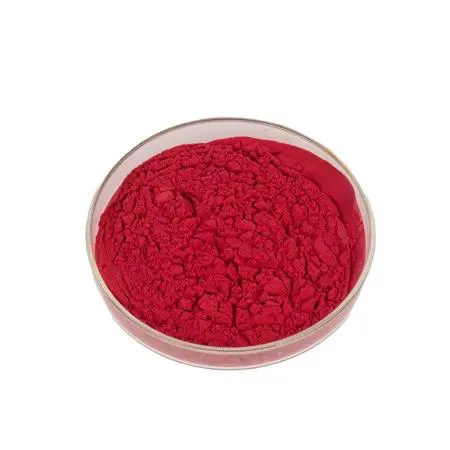- 0086-571-85302990
- sales@greenskybio.com
Enhancing Health with Every Scoop: The Wellness Benefits of Consuming Spray Dried Beetroot Juice Powder
2024-08-11

Introduction
In recent years, the search for natural and effective ways to enhance health has led to the discovery of many superfoods. Among them, Beetroot juice Powder, especially the spray - dried form, has gained significant attention. This article will explore the various wellness benefits it offers and how it can be incorporated into daily life for overall well - being.

What is Spray Dried Beetroot juice Powder?
Production Process
Spray drying is a method used to convert liquid beetroot juice into a powder form. The process involves spraying the beetroot juice into a hot air stream. As the liquid droplets come into contact with the hot air, the water evaporates rapidly, leaving behind a fine powder. This powder retains many of the nutrients present in the original beetroot juice.Nutritional Composition
Beetroot juice Powder is rich in essential nutrients. It contains a significant amount of vitamins, such as vitamin C, which is important for immune function and skin health. It also has minerals like potassium, which plays a crucial role in maintaining proper heart function and fluid balance in the body. Additionally, it is a source of dietary nitrates, which are responsible for many of its health - promoting effects.
Benefits for Cardiovascular Health
Lowering Blood Pressure
One of the most notable benefits of consuming spray - dried beetroot juice powder is its ability to help lower blood pressure. The dietary nitrates in beetroot are converted into nitric oxide in the body. Nitric oxide is a vasodilator, which means it relaxes and widens the blood vessels. This results in a decrease in blood pressure, reducing the risk of hypertension - related diseases such as heart attacks and strokes.Improving Blood Flow
By dilating blood vessels, beetroot juice powder also improves blood flow throughout the body. This enhanced blood flow is beneficial for delivering oxygen and nutrients to all cells and tissues. It can also help in reducing the build - up of plaque in the arteries, further protecting the cardiovascular system.Reducing Cholesterol Levels
Some studies suggest that regular consumption of beetroot products may also have a positive impact on cholesterol levels. It may help in reducing LDL (bad) cholesterol while maintaining or even increasing HDL (good) cholesterol. This balance is essential for a healthy cardiovascular system.
Enhancing Physical Performance
Increasing Endurance
Athletes and fitness enthusiasts are increasingly turning to beetroot juice powder to boost their performance. The nitrates in the powder can improve muscle efficiency during exercise. This leads to increased endurance, allowing individuals to exercise for longer periods without getting fatigued as quickly. For example, cyclists who consumed beetroot juice powder prior to a race were able to ride longer distances at a higher intensity.Reducing Muscle Fatigue
During intense physical activity, the build - up of lactic acid in muscles can cause fatigue. The nitric oxide produced from beetroot juice powder consumption can help delay the onset of muscle fatigue. It does this by improving blood flow to the muscles, which helps in the removal of lactic acid and the delivery of nutrients for energy production.Enhancing Oxygen Delivery
As mentioned earlier, the improved blood flow due to beetroot juice powder consumption means better oxygen delivery to the muscles. This is crucial for optimal physical performance, as oxygen is required for the efficient breakdown of nutrients to produce energy.
Antioxidant and Anti - Inflammatory Properties
Antioxidant Activity
Beetroot juice powder contains various antioxidants, such as betalains. These antioxidants help in neutralizing harmful free radicals in the body. Free radicals are unstable molecules that can cause damage to cells and DNA, leading to various diseases and aging. By scavenging these free radicals, beetroot juice powder helps in protecting the body from oxidative stress.Anti - Inflammatory Effects
Chronic inflammation is associated with many health problems, including heart disease, diabetes, and arthritis. The anti - inflammatory properties of beetroot juice powder can help in reducing inflammation in the body. This may be due to its antioxidant content as well as other bioactive compounds present in it.Digestive Health Benefits
Fiber Content
Beetroot juice powder contains dietary fiber, which is essential for a healthy digestive system. Fiber helps in promoting regular bowel movements, preventing constipation. It also adds bulk to the stool, which can be beneficial for those with digestive disorders such as irritable bowel syndrome.Supporting Gut Microbiota
The fiber in beetroot juice powder can also act as a prebiotic, feeding the beneficial bacteria in the gut. A healthy gut microbiota is important for overall health, as it is involved in digestion, immune function, and even mental health.Incorporating Spray Dried Beetroot Juice Powder into Daily Routines
Adding to Smoothies
One of the easiest ways to incorporate beetroot juice powder into your daily diet is by adding it to smoothies. You can combine it with fruits like bananas, berries, and a liquid such as almond milk or water. This creates a delicious and nutritious drink that can be consumed for breakfast or as a snack.Mixing into Yogurt
Another option is to mix beetroot juice powder into yogurt. Plain yogurt is a great base, and the addition of the powder gives it a boost of nutrition and a unique flavor. You can top it with nuts or seeds for added crunch and nutrition.Using in Baking
For those who enjoy baking, beetroot juice powder can be used as an ingredient in muffins, cakes, or bread. It not only adds a pop of color but also imparts its health benefits to the baked goods. However, it's important to note that the high heat of baking may affect some of the nutrients, but many will still be retained.Conclusion
Spray - dried beetroot juice powder is a versatile and highly nutritious addition to a health - conscious diet. Its numerous wellness benefits, ranging from improving cardiovascular health to enhancing physical performance and providing antioxidant and anti - inflammatory properties, make it a valuable superfood. With easy ways to incorporate it into daily routines, there's no reason not to give this powder a try for overall well - being.
FAQ:
What is spray - dried beetroot juice powder?
Spray - dried beetroot juice powder is a concentrated form of beetroot juice. It is made through a process called spray drying, which involves converting the liquid beetroot juice into a powdered form while preserving its beneficial components. This powder retains many of the nutrients and health - promoting properties found in fresh beetroot juice.
How does spray - dried beetroot juice powder boost cardiovascular health?
Spray - dried beetroot juice powder can boost cardiovascular health in several ways. It contains nitrates, which are converted to nitric oxide in the body. Nitric oxide helps to relax and dilate blood vessels, reducing blood pressure. This improved blood vessel function also enhances blood flow, which can lower the risk of heart disease and improve overall cardiovascular function.
Can spray - dried beetroot juice powder really enhance physical performance?
Yes, it can. The nitrates in spray - dried beetroot juice powder increase nitric oxide production. This can improve oxygen delivery to muscles during exercise. As a result, it may enhance endurance, reduce fatigue, and improve overall physical performance. Athletes and fitness enthusiasts often use it as a natural performance - enhancing supplement.
How can one incorporate spray - dried beetroot juice powder into daily routines?
There are several ways to incorporate spray - dried beetroot juice powder into daily routines. It can be added to smoothies, along with fruits and other ingredients. It can also be mixed into yogurt, oatmeal, or used in baking. Some people even dissolve it in water or juice and drink it directly for a quick and easy way to get its benefits.
Are there any side effects of consuming spray - dried beetroot juice powder?
In general, spray - dried beetroot juice powder is safe for consumption. However, some people may experience side effects such as a change in urine color (it may turn pink or red), or digestive issues like mild stomach upset in rare cases. If you have any pre - existing medical conditions or are taking medications, it is advisable to consult a healthcare provider before adding it to your diet.
Related literature
- The Health Benefits of Beetroot Juice: A Review of the Evidence"
- "Beetroot Juice and Athletic Performance: A Meta - analysis"
- "Nitrate - Rich Foods, such as Beetroot, and Cardiovascular Health"
- ▶ Hesperidin
- ▶ Citrus Bioflavonoids
- ▶ Plant Extract
- ▶ lycopene
- ▶ Diosmin
- ▶ Grape seed extract
- ▶ Sea buckthorn Juice Powder
- ▶ Fruit Juice Powder
- ▶ Hops Extract
- ▶ Artichoke Extract
- ▶ Mushroom extract
- ▶ Astaxanthin
- ▶ Green Tea Extract
- ▶ Curcumin
- ▶ Horse Chestnut Extract
- ▶ Other Product
- ▶ Boswellia Serrata Extract
- ▶ Resveratrol
- ▶ Marigold Extract
- ▶ Grape Leaf Extract
- ▶ New Product
- ▶ Aminolevulinic acid
- ▶ Cranberry Extract
- ▶ Red Yeast Rice
- ▶ Red Wine Extract
-
Buckthorn bark extract
2024-08-11
-
Curcuma Longa Extract/Turmeric extract
2024-08-11
-
Diosmin
2024-08-11
-
Moringa powder
2024-08-11
-
Yellow Pine Extract
2024-08-11
-
Saw Palmetto Extract
2024-08-11
-
Apricot Powder
2024-08-11
-
Chia Seed Powder
2024-08-11
-
Epimedium extract powder
2024-08-11
-
Peppermint Oil
2024-08-11





















